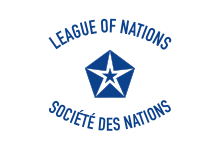Portal:1920s
The 1920s Portal
Silent films were popular in this decade, with the highest-grossing film of this decade being either the American silent epic adventure-drama film Ben-Hur: A Tale of the Christ or the American silent war drama film The Big Parade, depending on the metrics used. Sinclair Lewis was a popular author in the United States in the 1920s, with his books Main Street and Elmer Gantry becoming best-sellers. Best-selling books outside the US included the Czech book The Good Soldier Švejk, which sold 20 million copies. Songs of this decade included "Mack the Knife" and "Tiptoe Through the Tulips". During the 1920s, the world population increased from 1.87 to 2.05 billion, with approximately 700 million births and 525 million deaths in total. (Full article...) Selected article - The League of Nations (French: Société des Nations [sɔsjete de nɑsjɔ̃]) was the first worldwide intergovernmental organisation whose principal mission was to maintain world peace. It was founded on 10 January 1920 by the Paris Peace Conference that ended the First World War. The main organization ceased operations on 18 April 1946 when many of its components were relocated into the new United Nations. As the template for modern global governance, the League profoundly shaped the modern world. The League's primary goals were stated in its eponymous Covenant. They included preventing wars through collective security and disarmament and settling international disputes through negotiation and arbitration. Its other concerns included labour conditions, just treatment of native inhabitants, human and drug trafficking, the arms trade, global health, prisoners of war, and protection of minorities in Europe. The Covenant of the League of Nations was signed on 28 June 1919 as Part I of the Treaty of Versailles, and it became effective with the rest of the Treaty on 10 January 1920. Australia was granted the right to participate as an autonomous member nation, marking the start of Australian independence on the global stage. The first meeting of the Council of the League took place on 16 January 1920, and the first meeting of the Assembly of the League took place on 15 November 1920. In 1919, U.S. president Woodrow Wilson won the Nobel Peace Prize for his role as the leading architect of the League. (Full article...)Featured picture A portrait of Lillian Gish from 1921. Gish was one of the first female movie stars, called "The First Lady of American Cinema", starting in 1912 and continuing to appear in films until 1987. The American Film Institute named Gish 17th among the greatest female stars of all time and awarded her a Life Achievement Award, making her the only recipient who was a major figure in the silent era. Remarkably, she never won an Academy Award for her work, although she did receive a Special Academy Award in 1971. Did you know...
Related portalsSelected biography -
Gillis Emanuel Grafström (7 June 1893 – 14 April 1938) was a Swedish figure skater. He was born in Stockholm, Sweden. He won three successive Olympic gold medals in Men's Figure Skating (1920, 1924, 1928) as well as an Olympic silver medal in the same event in 1932, and three World Championships (1922, 1924, 1929). He and Eddie Eagan are the only athletes to have won a gold medal at both the Summer and Winter Olympic Games. Grafström has the further distinction of being the only person to have won an individual gold medal in both the Summer (1920) and Winter Olympics (1924, 1928), although Eagan remains the only one to have managed the feat in different disciplines. Grafström is one of the few athletes who have competed in both the Summer and Winter Olympic games. He is one of the oldest figure skating Olympic champions. (Full article...)
TopicsWikiProjects
List articlesMore Did you know (auto generated)
CategoriesGeneral imagesThe following are images from various 1920s-related articles on Wikipedia.
Recognized content
Associated WikimediaThe following Wikimedia Foundation sister projects provide more on this subject:
Discover Wikipedia using portals |




















































